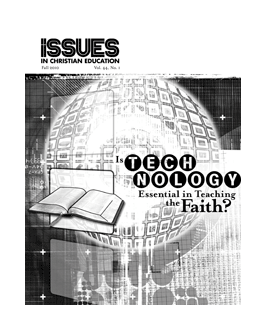Issues in Christian Education, a journal produced by Concordia University Nebraska, Seward, Neb., since 1966, is now available only online.
The electronic Issues will be produced three times a year. Just like its pr int predecessor, each issue of the free publication will focus on a selected theme through articles, editorials and book reviews. The theme of the spring 2012 issue, available in March, will be “Transforming Congregational Education.”
int predecessor, each issue of the free publication will focus on a selected theme through articles, editorials and book reviews. The theme of the spring 2012 issue, available in March, will be “Transforming Congregational Education.”
The journal focuses on the Synod’s educational ministry and is written for pastors, teachers and other professional church workers, as well as interested laypeople.
Making the journal electronic-only is intended to “expand readership in the LCMS,” according to Dr. Brian L. Friedrich, president of Concordia University Nebraska.
“For example, pastors and other church workers can download an edition and distribute copies to their entire congregations,” Friedrich told Reporter. “Every member of a school faculty can access an edition for study and discussion. Editions can be made available through a variety of electronic media, such as social media.”
Another plus, he added, is that past editions are being electronically archived and will be available on the university’s website, creating “broader and easier access of a rich resource for our readership and beyond.”
Friedrich said the online format will help carry out a major purpose of the journal, penned by the first editorial committee: that the publication would be “an instrument for evaluating broad and pervasive educational issues by asking what is happening in educational thought and why — keeping in mind that ‘the greatest educational issue in any life at any time being to know God, the only true God, and Jesus Christ, whom He has sent’ (W. Theophil Janzow, 1966).
“As our access to and service of a global audience increases through our online transition, we are able to continue carrying that purpose forward,” Friedrich said.
With its new online format, the journal “will be able to direct readers to related and other topics, past editions of Issues and other supporting research,” he added, and can include “community response and conversation,” particularly through social networks such as Twitter and Facebook.
“In addition to providing information that can be consumed, we have the opportunity for readers to actively participate in the conversation and more fully enable people to talk with other people about issues vital to our life together as God’s people,” Friedrich said.
To download a PDF of Issues in Christian Education — and see past issues since 2004 — click here.
Posted Jan. 27, 2012



